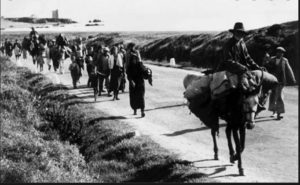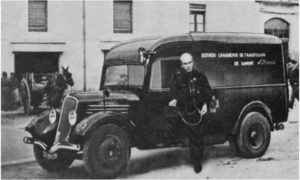Awakening Canadians to war crimes
 These atrocities and war crimes. They’re hitting us so hard, I think, because we’re experiencing them in real time – almost as they happen — from the comfort of our living rooms. To those who have poked around in the history of the 20th century, the horrors being wrought in Ukraine by Vladimir Putin are all too familiar. I’ve been working on a book called THE GREAT CANADIAN AWAKENING: Trump’s America, Hitler’s France, Canada’s Future. While sounding an alarm, it tracks the rise of fascism today and yesterday. Here’s an excerpt from a chapter that focuses on Norman Bethune, the inspirational Canadian surgeon, during the Spanish civil war. It’s called Bethune Witnesses Atrocity. See if Malaga, Spain, doesn’t put you in mind of Mariupol, Ukraine.
These atrocities and war crimes. They’re hitting us so hard, I think, because we’re experiencing them in real time – almost as they happen — from the comfort of our living rooms. To those who have poked around in the history of the 20th century, the horrors being wrought in Ukraine by Vladimir Putin are all too familiar. I’ve been working on a book called THE GREAT CANADIAN AWAKENING: Trump’s America, Hitler’s France, Canada’s Future. While sounding an alarm, it tracks the rise of fascism today and yesterday. Here’s an excerpt from a chapter that focuses on Norman Bethune, the inspirational Canadian surgeon, during the Spanish civil war. It’s called Bethune Witnesses Atrocity. See if Malaga, Spain, doesn’t put you in mind of Mariupol, Ukraine.
On the evening of Sunday February 7, 1937, with two of his men, Norman Bethune started driving southwest out of Valencia, bound for the coastal city of Malaga some 620 km away. He was bent on expanding his medical service. After covering 170 km, a sandstorm forced the trio to stop at a small hotel in Alicante. Next morning, Bethune heard a rumor that the Fascists had taken Malaga, population 100,000. He carried on, stopping next in Murcia to visit local hospitals. Here he left one of two vehicles, the Ford, in which he and his men had been traveling, and carried on in the larger Renault truck.
On February 10, the trio reached Almeria, 200 km from his destination. There Bethune learned that early on Sunday morning, three warships had shelled Malaga while airplanes dropped leaflets warning militiamen to vacate the city. Late that afternoon, the leaders of the Republican Army of the South – democracy’s defenders — had decamped without notice. Malagans feared that Francisco Franco’s North African troops were upon them: “The Moors are coming, the Moors are coming.” On Monday, people took to the highway that twisted east along the coast towards Almeria. With the country to the southwest already in Nationalist hands, this was the only possible direction in which to escape.
Having waltzed into Malaga unopposed, Italian troops began harassing the fleeing refugees. Fighter planes strafed the masses and two warships pounded them with shells. The slaughter would continue for nearly three days. From Almeria, Bethune and his men drove west into the debacle. They began seeing scattered groups of people coming towards them, sometimes with mules carrying their possessions. These were the first groups of refugees. Separated groups became a steady stream.
At the crest of a hill, Bethune and his men stood and looked at the road ahead, which was just a moving black line of refugees. Cut into the rocky coast along the edge of the Sierra Nevada mountains, this road was now the only way out of Malaga. Defeated militiamen shuffled along, maybe 3,000 in all, their uniforms dusty and torn. Civilians followed, some of them shoeless or with bloody rags wrapped around their feet. Mothers carried babies and fathers larger children on their backs or shoulders.
Bethune and his two traveling companions stood debating what to do. They carried no weapons. What if they encountered Italian soldiers? Bethune pointed to Spanish lettering on the side of the truck: “See that, boys? ‘Service at the front.’ To the front we go.” They saw older men and women who had collapsed at the side of the road. But Bethune was more troubled by the sight of children, hundreds of them, some without shoes, struggling forward. With night coming on, Bethune pulled over and stopped. He had decided to turn the Renault around, fill it with children and perhaps a few mothers, and shuttle them back to Almeria.
The moment he opened the doors, people gathered around. He crammed three dozen children and women into the truck, slammed the door shut, and sent Hazen Size driving to Almeria, telling him to return as soon as he could. With Thomas Worsley, Bethune took to tramping along with the refugees, back the way he had come. Around midnight, he spotted a stable not far from the road and found enough straw to make a rough bed. Back on the road before dawn, he saw the headlights of the Renault returning from Almeria.
Bethune sent both Worsley and Size to Almeria with a second load of children and women while he walked on along the coastal road. Approaching Castell de Ferro, about 90 km from Almeria, he heard airplanes, looked up, and saw three Italian Fiats attacking two small Republican bombers. One of the latter got hit and, with smoke trailing, spiraled down into the water. Later, he would learn it was a Potez from a squadron Andre Malraux had formed in 1936. Bethune scrambled down a steep bank and joined a small crowd on the shore, where militiamen helped crewmen ashore – two unharmed, five seriously injured.
Bethune took charge, wading out to the plane and ripping out wires to serve as tourniquets. Somehow he commandeered a truck and got in with the wounded. He did what he could without instruments, but the co-pilot died en route. At Almeria, surgeons amputated the arm of one man while Bethune performed necessary transfusions on other badly injured men, all of whom died – possibly because the blood had been spoiled by repeated shaking along the road.
Around 7 p.m., the lights went out and a siren sounded. Then the ground shook amidst thunderous explosions. When they stopped, Bethune heard screams. He stepped into the street and saw buildings engulfed in flames. He ran towards the burning buildings hollering, “Medico! Medico!” People were trapped beneath broken walls and timbers and electrical wires. The German Condor Legion had carried out a savage attack on defenseless civilians – the same infamous squad that, two months later, would destroy the town of Guernica.
Bethune and his men went out, collected one more load of refugees, and got back to Almeria around midnight. He was sickened and enraged by the attack on the defenseless refugees, especially the children. Unable to sleep, he wrote a furious account of the past three days — The Crime on the Road: Malaga-Almeria – and later published it as a pamphlet. This forced march, he wrote, was “the largest, most terrible evacuation of a city in modern times.”
After describing the horror on the highway, the slaughter of unarmed peasants, he turned to the saturation bombing of Almeria by German and Italian fascist airplanes. These did not try to hit the government battleship in the harbor or the soldiers’ barracks, her wrote, but “deliberately dropped ten great bombs in the very center of the town where on the main street were sleeping huddled together on the pavement . . . the exhausted refugees.” Bethune carried three dead children from “where they had been standing in a great gueue waiting for a cupful of preserved milk and a handful of dry bread, the only food some of them had for days.” . . .
A gripping excerpt, Ken. I’m intrigued by the range of the book title.
Thanks, Bernard. Quite a range, for sure. But I do believe I’ve managed to tame the beast. This involved throwing out one frame (15-20,000 words) and replacing it with another. Oh, and turning the projected long book (over 100,000 words) into a focused short book (50,000 words). Now it’s in the arms of my agent.
Great read Ken. Thanks for sharing.
It sounds like another winner, Ken. I’ve been meaning to write you to tell you we had a sort of mini Ken McGoogan Festival here around Christmas time. A friend who spends a lot of time at my house was looking for something to read and I gave him a couple of your Franklin books, which he was very enthusiastic about. Then, by chance in the same week, we saw you in he flesh, as it were, in one of your northern documentaries. It was a good week.
Merna, thanks so much for the lovely note. Made my day. Trust your own writing is going well.